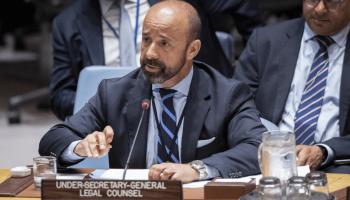The EC's annual progress report on reforms in the Western Balkans, released earlier this month, found that drug trafficking is “a serious concern,” and Kosovo remains an “area of origin, transit and destination for trafficking in human beings.” While citing some progress made in police reform, the assessment bluntly concludes: “There is no strategy to fight organized crime.”
The report comes at a critical point in the EU's upcoming implementation of the EU Rule of Law Mission in Kosovo (EULEX), which will seek to assume oversight of police and judicial reforms from the outgoing UN Mission (UNMIK). The EULEX mission will involve 2,000 personnel, composed of police officers, judges, and prosecutors, intended to mentor and train their local counterparts. Among the mission's principal aims is the establishment of a new Kosovo Special Prosecutors Office to handle organized crime cases.
Under European pressure, Serbian officials last month backed off their previous objections to the mission's presence in Kosovo and conceded they would accept EULEX deployment contingent upon the mission's approval by the UN Security Council and upon its neutrality with regard to the status of Kosovo's independence.
Two Spheres of Inluence Envisioned Hashim ThaciThese concessions were incorporated into a six-point plan for the transfer of authority from UNMIK to EULEX proposed by UN Secretary-General Ban Ki-moon and drafted on November 10. The plan's crucial provision would divide international oversight into two spheres of influence, with minority Serb police in northern Kosovo remaining under UN supervision, while ethnic Albanian police throughout the rest of Kosovo would work with EULEX.
Hashim ThaciThese concessions were incorporated into a six-point plan for the transfer of authority from UNMIK to EULEX proposed by UN Secretary-General Ban Ki-moon and drafted on November 10. The plan's crucial provision would divide international oversight into two spheres of influence, with minority Serb police in northern Kosovo remaining under UN supervision, while ethnic Albanian police throughout the rest of Kosovo would work with EULEX.
Although Serbia announced it would approve the plan, it was rejected by officials in Pristina last week. They insisted that it would serve as a partition and impede Kosovo's independence. “There will be no illegal or illegitimate structures in Kosovo, no parallel judicial system, police, customs or other sectors. We will function as a stable united country with a functional system for all Kosovo’s citizens,” Kosovo Prime Minister Hashim Thaci told Serbian media on Tuesday.
Officials in Pristina are soon expected to reach an agreement with EU officials on EULEX deployment that would bypass the agreement between the UN and Belgrade. EU spokeswoman Christina Gallach announced in late October that EULEX would be operational by December, reflecting optimism that a compromise will be found. Yet widespread opposition persists in Kosovo to any concession involving EULEX's neutrality. An attack on the EU's International Civilian Office in Pristina last Friday in which explosives were lobbed from a car into the building's yard underlined Kosovo's potential for instability, and the challenges it faces in establishing rule of law.
--Michael Mehen
UN Staffers Detained in Kosovo as Part of Organized Crime Probe
The head of the United Nations Mission in Kosovo harshly criticized the Kosovo police during Monday’s UN Security Council...





